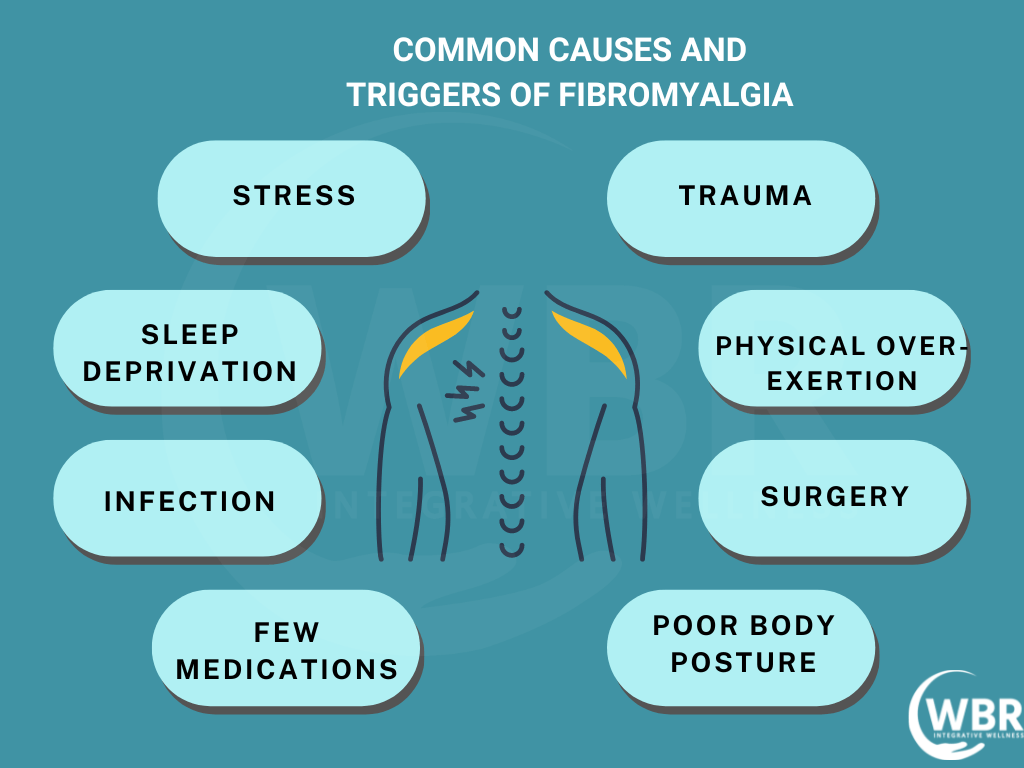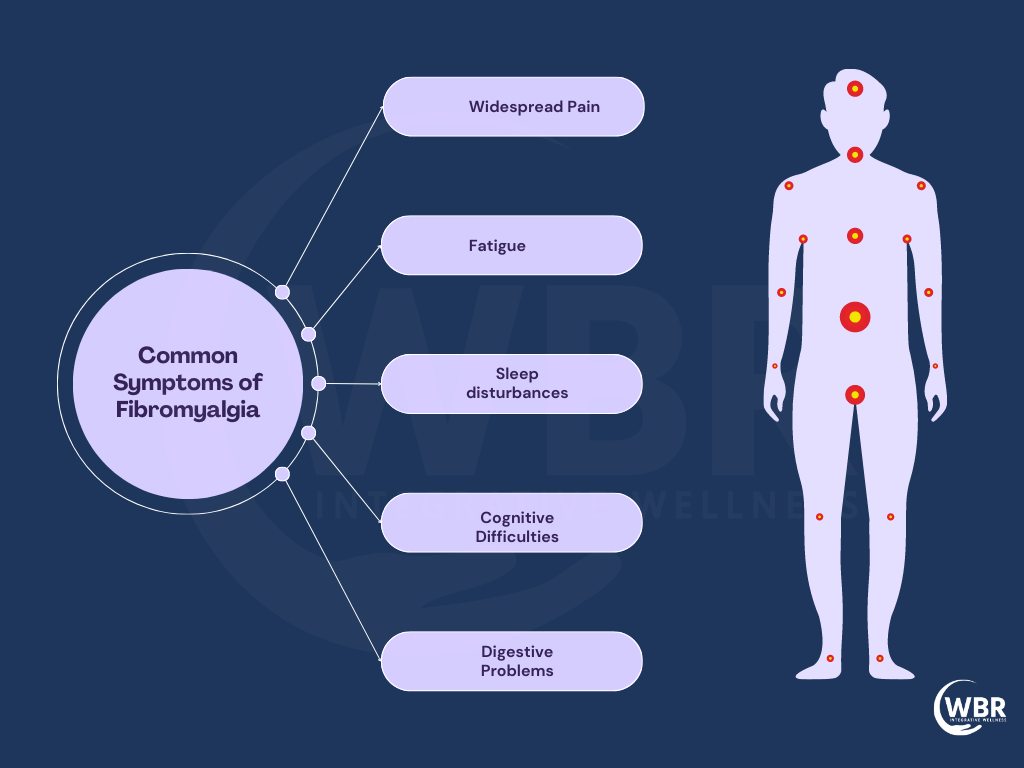Functional Medicine Approach To Fibromyalgia
Fibromyalgia is a chronic condition characterized by widespread pain, fatigue, and sleep disturbances. While there is no known cure for fibromyalgia, many individuals find relief through natural approaches that focus on improving overall health and well-being. In this blog, we will explore the benefits of taking a natural approach to treat fibromyalgia. We will delve into various lifestyle changes and alternative therapies, such as dietary modifications, exercise, meditation, acupuncture, and massage therapy, that help in managing symptoms, reducing pain, and improving quality of life. By adopting a natural approach, individuals with fibromyalgia are able to take control of their health and find a path towards a happier, healthier life.
What is Fibromyalgia
Fibromyalgia is a chronic condition that affects the musculoskeletal system, causing widespread pain and tenderness throughout the body. It is a disorder with other symptoms such as fatigue, sleep disturbances, and cognitive difficulties known as “fibro fog”. While the exact cause of fibromyalgia is unknown, researchers suggest that it is related to abnormalities in the way the brain processes pain signals. It is a condition that affects predominantly women, and it is estimated that up to 4% of the population may have fibromyalgia. Symptoms of fibromyalgia are debilitating and greatly impact a person’s quality of life, making it difficult to perform daily tasks, work, or enjoy social activities. While there is no known cure for fibromyalgia, there are various natural approaches that help manage the symptoms and treat Fibromyalgia.
Causes of Fibromyalgia
The exact causes of fibromyalgia are not fully understood, but researchers believe that it is related to a combination of genetic, environmental, and neurological factors. Understanding the causes helps to treat Fibromyalgia more effectively. Some of the possible causes of fibromyalgia include:
- Genetics: There may be certain genetic mutations or variations that make individuals more susceptible to fibromyalgia.
- GUT Dysbiosis : Most patients will have some level of dysbiosis. SIBO/IMO along with IBS is common in patients with fibromyalgia. Other microbial imbalances that include overgrowth species with high Lactate production (e.g. Streptococcus) may contribute to enhanced intestinal permeability and systemic inflammation
- Neuroinflammation: This leads to central nervous system sensitisation. This may have many root causes including the action of inflammatory cytokines as a result of increased lipopolysaccharide (LPS) exposure from the gut via enhanced intestinal permeability.
- Mitochondrial dysfunction : Both fibromyalgia and chronic fatigue syndrome are often associated with mitochondrial dysfunction.
- Environmental Factors: Certain triggers such as infections, physical or emotional trauma, or even weather changes sometimes leads to the onset of fibromyalgia symptoms.
- Hormonal Imbalances: Imbalances in hormones such as cortisol, which is involved in the body’s stress response play a role in the development of fibromyalgia.
- Sleep Disturbances: Sleep disturbances and disorders such as sleep apnea, insomnia, or restless leg syndrome contribute to the development of fibromyalgia.
- Toxicity: This is often at play and especially metals such as aluminium, lead and mercury. Among many possible effects, these elements can also overtly impair the enzymes involved in the various steps of the citric acid cycle that support cellular respiration in the mitochondria.
It is important to note that fibromyalgia is a complex condition, and the causes vary from person to person. A combination of these factors contributes to the development of fibromyalgia in some individuals.

Symptoms of Fibromyalgia
Fibromyalgia is a complex condition that affects different people in different ways. In to order to treat Fibromyalgia, patients first need to understand the symptoms. The most common symptoms of fibromyalgia include:
- Widespread Pain: Pain is the hallmark symptom of fibromyalgia. It typically affects the muscles, joints, and soft tissues throughout the body and varies in intensity.
- Fatigue: People with fibromyalgia often experience overwhelming fatigue and a lack of energy, which impacts their ability to perform daily tasks.
- Sleep Disturbances: Sleep disturbances are common in people with fibromyalgia, with symptoms such as insomnia, sleep apnea, and restless leg syndrome.
- Cognitive Difficulties: People with fibromyalgia may experience cognitive difficulties, commonly known as “fibro fog”. This includes problems with memory, concentration, and decision-making.
- Headaches: Headaches, including migraines, are common symptoms of fibromyalgia.
- Digestive Problems: Some people with fibromyalgia may experience digestive issues such as irritable bowel syndrome, bloating, and constipation.
- Depression and Anxiety: Fibromyalgia takes a toll on mental health, leading to depression and anxiety in some individuals.
It is important to note that fibromyalgia symptoms vary from person to person and may change over time.

Nutritional Approach
Making dietary changes often helps manage symptoms and improve overall health. A balanced diet that includes nutrient-dense whole foods provides the body with the necessary vitamins, minerals, and antioxidants to reduce inflammation and boost energy levels. Here are some dietary guidelines that can be beneficial for people with fibromyalgia:
- Eat a variety of fruits and vegetables: Include a variety of colourful fruits and vegetables in your diet, as they are rich in antioxidants that reduce inflammation.
- Choose lean proteins: Opt for lean protein sources such as legumes and tofu as they provide energy without causing inflammation.
- Include healthy fats: Omega-3 fatty acids found in fish, nuts, and seeds help reduce inflammation and provide a healthy source of fat.
- Avoid processed and high-sugar foods: Processed foods, high-sugar drinks, and snacks increase inflammation and worsen symptoms.
- Drink plenty of water: Staying hydrated helps improve energy levels and reduce fatigue.
- Consider eliminating trigger foods: Some people with fibromyalgia may have food sensitivities or intolerances that worsen symptoms. Consider eliminating trigger foods and gradually reintroducing them to determine which foods are problematic.
It is important to speak with a healthcare provider or registered dietitian to determine the best dietary approach to manage fibromyalgia symptoms.
Physical Movement
Poor physical activity, such as a sedentary lifestyle, is associated with increased symptoms of fibromyalgia. Lack of exercise leads to weakened muscles, decreased flexibility, and increased pain and stiffness. Furthermore, decreased physical activity contributes to weight gain, which exacerbates symptoms.
On the other hand, regular physical activity helps improve symptoms of fibromyalgia. Studies show that just 30 minutes of moderate-intensity exercise helps reduce pain and fatigue and improve physical function in people with fibromyalgia.
Exercise helps release endorphins, which are the body’s natural pain relievers, and help reduce inflammation. Additionally, physical activity helps improve cardiovascular health, strengthen muscles, and increase flexibility, which contributes to reducing pain and improving overall function.
Incorporating regular physical activity into a fibromyalgia treatment plan is challenging, but starting slow and gradually increasing the duration and intensity of exercise is helpful. Consulting with a healthcare provider or physical therapist helps tailor an exercise plan to individual needs and limitations.
Overall, incorporating just 30 minutes of physical activity into a daily routine is helpful to reduce symptoms of fibromyalgia and improve overall well-being.
Mind-Body Therapies
Mind-body therapies, such as acupuncture and meditation, help relieve symptoms of fibromyalgia. These therapies work by helping to reduce stress, improve sleep quality, and alleviate pain.
Acupuncture
It is an ancient Chinese therapy that involves inserting thin needles into specific points on the body, is effective in reducing pain and improving the quality of life in people with fibromyalgia. Acupuncture may help release endorphins, which are natural pain relievers, and help reduce inflammation and improve blood flow.
Meditation
It involves quieting the mind and focusing on the present moment which helps reduce stress and improve sleep quality, which are common issues for people with fibromyalgia. Meditation is done in various forms such as mindfulness meditation, body scan meditation, and mantra meditation, and should be incorporated into a daily routine.
Supplementation Support
Below combinations of supplementation may help reduce symptoms and improve quality of life.
- Omega-3 Fatty Acids: These acids are a type of healthy fat found in fish oil, flaxseed, and chia seeds. They have anti-inflammatory properties that help reduce pain and stiffness associated with fibromyalgia. Studies show that omega-3 supplements with total EPA + DHA of 4 grams/day or more also improve mood and cognitive function in people with fibromyalgia. Also SPMs (Specific Pro Resolving Mediators) can be very useful.
- Vitamin D: It is an essential nutrient that plays a role in immune function, bone health, and muscle function. Studies show that people with fibromyalgia often have low levels of vitamin D and that supplementing with vitamin D may help reduce pain and improve overall well-being.
- Magnesium: It is a mineral that is involved in several bodily processes, including muscle and nerve function. Low levels of magnesium are linked to increased pain and muscle tension, which are common symptoms of fibromyalgia. Supplementing with magnesium helps reduce these symptoms and improve sleep quality.
- S-Adenosylmethionine: It is a natural compound that is involved in several bodily processes, including the production of neurotransmitters that regulate mood and pain perception. Studies show that it helps reduce pain and improve mood in people with fibromyalgia.
- Ribose. It has been postulated that patients with fibromyalgia have an alteration in muscle adenine nucleotide metabolism, which leads to depleted energy reserves. Ribose can help in improvement of chronic fatigue.
- Acetyl-L-carnitine: ALC serves as a source of L-carnitine (which plays a role in mitochondrial energy production) and also functions as a neurotransmitter. Supplementation with 1,500 mg/day of ALC for 10 weeks appeared to be beneficial for patients with fibromyalgia
- Coenzyme Q10: Adenosine triphosphate (ATP) concentrations have been found to be low at sites of tenderness in patients with fibromyalgia. As a cofactor in the electron-transport chain, coenzyme Q10 (CoQ10) plays an essential role in ATP production. Supplementation with 300 mg/day of CoQ10 for 8 weeks and more reduced the number of tender points and improved pain, fatigue, headaches, anxiety, and depression in patients with fibromyalgia.
- Thiamine: Thiamine status was lower in patients with fibromyalgia than in healthy controls. Dose can be 100 to 600 mg per day. Thiamine pyrophosphate was more effective than thiamine, which suggests that some patients with fibromyalgia have a decreased capacity to convert thiamine to thiamine pyrophosphate. Thiamine supplementation may lead to magnesium deficiency, so magnesium support is helpful in this case.
- Vitamin E: Supplementation with 120–300 IU/day of vitamin E or 2–8 ml/day of wheat germ oil (which contains vitamin E) resulted in rapid and marked symptomatic improvement in nearly all patients with fibromyalgia.
- Methylated B Complex: Fibromyalgia cases were found to have higher brain levels of homocysteine. A methylated B-complex for general support may be appropriate for many patients.
Note: Consulting with a healthcare provider helps determine the best approach to managing fibromyalgia symptoms.
Botanicals Approach
Botanicals are a popular natural approach to treating fibromyalgia, with some herbs showing promising results in reducing symptoms. Here are three of the top botanicals for treating fibromyalgia:
- Turmeric and Ginger: Both turmeric and ginger have anti-inflammatory properties, and reduce pain and stiffness resulting from fibromyalgia. Turmeric contains a compound called curcumin, which reduces inflammation and improves cognitive function in people with fibromyalgia. Ginger also has anti-inflammatory properties and helps reduce muscle pain and soreness.
- Boswellia: Boswellia, also known as Indian frankincense, is a herb that is useful to treat inflammatory conditions. Studies show that Boswellia helps reduce pain and inflammation in people with fibromyalgia, and improves joint mobility.
- St. John’s Wort: St. John’s Wort is a common herb useful in treating depression, anxiety, and sleep disturbances. Studies show that St. John’s Wort is effective in reducing pain and fatigue in people with fibromyalgia, as well as improving mood and sleep quality.
Conclusion
Fibromyalgia is a chronic condition that causes a variety of debilitating symptoms. Treatments most frequently used included identification and avoidance of allergenic foods, general dietary improvements (avoiding refined carbohydrates, processed foods, food additives, etc.), oral nutritional supplements (magnesium, B vitamins, and others), and thyroid hormone when appropriate. A comprehensive integrative treatment program was more effective in many cases than any one treatment by itself. By taking a natural approach to managing fibromyalgia, many people are able to reduce their symptoms and improve their overall well-being.









